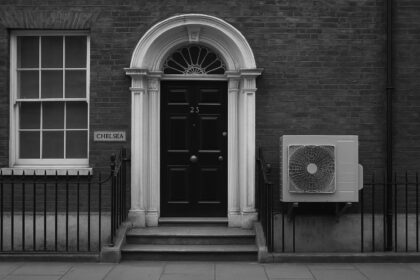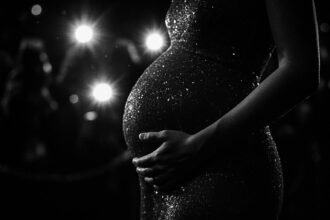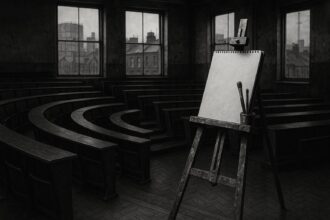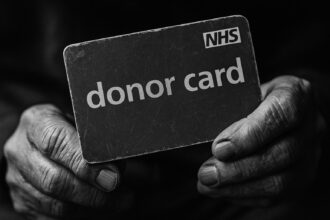Ireland’s 2025 Eurovision entry fails to qualify for the final amid criticism of its concept and performer nationality, sparking debate on restoring the country’s former glory by embracing authentic and politically resonant performances.
Last weekend, I found myself transfixed by the Eurovision Song Contest final for the first time, drawn into the spectacle partly due to my mother’s investment in Portugal’s entry through her office sweepstake. However, there was a palpable sense of disappointment resonating from Irish fans regarding their entry, “Laika Party,” performed by Emmy Kristiansen. The song, which pays tribute to Laika, the unfortunate canine launched into space by the Soviets in 1957, finished 13th out of 16 countries in the semi-finals, failing to qualify for the final round of the competition.
Despite its upbeat Euro-pop vibe, many felt that choosing a tribute to a historic dog—especially one marred by tragedy—was an unusual and perhaps misguided choice for an Irish entry. The context of the song—while perhaps meaningful to some—may not have resonated with a broader audience, including dog lovers who would rather celebrate the joys of their pets than revisit the somber saga of Laika. The decision to rely on a performer from Norway, despite Ireland’s rich musical heritage, further complicated the narrative, making it feel like a decision devoid of national pride.
Historically, Ireland enjoyed a golden era at Eurovision, with a record-breaking seven victories. The peak years of the 1990s saw Ireland clinch three consecutive wins, a feat that remains unmatched. However, since then, the Irish entries have struggled, with the last notable success occurring in 2000. This decline is echoed in the UK’s Eurovision journey, which, while historically stronger—with five wins and a staggering 16 second-place finishes—has also faced challenges in recent editions. Various factors have been proposed to explain the difficulties experienced by both nations, including a perceived lack of seriousness and the geographical isolation that might dull their distinctiveness in such a competitive landscape.
Moreover, Eurovision has evolved significantly over the years, morphing into a sophisticated platform that melds musical talent with political statements. The recent controversy surrounding Israel’s entry highlighted this shift; while Yuval Raphael secured second place, allegations surfaced regarding potential vote manipulation, particularly given the political tensions that have overshadowed the contest. The resonance of her song, “New Day Will Rise,” perhaps demonstrates how personal narratives can sometimes transcend political divides in a contest riddled with such complexities.
The intertwining of music and politics was further underlined by Bruce Springsteen’s scathing commentary on the current state of US governance during a concert in Manchester. Springsteen’s remarks regarding a “corrupt and incompetent” administration sparked a heated exchange with former President Donald Trump, who notably responded with personal attacks rather than engaging with the substance of Springsteen’s critique. This clash between artistic expression and political discourse serves as a reminder of the vital role artists play in shaping public dialogue—something that could benefit Eurovision should it embrace a more profound connection between culture and current affairs.
As it stands, the question looms: what does the future hold for Ireland at Eurovision? A return to its roots might be an investment in authenticity and a re-evaluation of what it means to represent the nation on such a grand stage. Perhaps a collaboration with artists of the calibre of Springsteen would inject a refreshing perspective into future entries, infusing them with not just catchy tunes but also narratives that evoke genuine emotional responses and foster connectivity among viewers.
As I reflected on the contest, I learned that my investment in Portugal was ultimately misplaced, with the country finishing in 21st place. Nonetheless, the ongoing evolution of Eurovision, coupled with the challenges faced by historic musical nations, poses an intriguing question: can nations like Ireland find their winning formula again amidst the complexities of modern competition?
Reference Map:
- Paragraph 1 – [1], [2]
- Paragraph 2 – [1], [4]
- Paragraph 3 – [6], [3]
- Paragraph 4 – [5]
- Paragraph 5 – [1], [7]
Source: Noah Wire Services
- https://www.irishnews.com/entertainment/ireland-needs-bruce-springsteen-to-bring-back-eurovision-glory-sophie-clarke-YUQI34BI45C6NEZKXXKTNW4S2I/ – Please view link – unable to able to access data
- https://www.irishnews.com/entertainment/ireland-needs-bruce-springsteen-to-bring-back-eurovision-glory-sophie-clarke-YUQI34BI45C6NEZKXXKTNW4S2I/ – Sophie Clarke discusses Ireland’s declining performance in the Eurovision Song Contest, highlighting the 2025 entry ‘Laika Party’ by Emmy Kristiansen, which failed to qualify. She notes Ireland’s past successes, including seven wins and a record three consecutive victories, but points out recent struggles. Clarke also mentions the UK’s mixed results and suggests that factors like lack of seriousness and geographical isolation may contribute to the challenges faced by both countries in the competition.
- https://www.apnews.com/article/3bbeb077e9e5de03f9d47c2121933f26 – A heated exchange erupted between Bruce Springsteen and President Donald Trump following Springsteen’s criticism of the U.S. administration during a Manchester concert. Springsteen described the administration as ‘corrupt and authoritarian,’ urging fans to defend democracy. In response, Trump called Springsteen a ‘dried out prune’ and ‘overrated,’ questioning the legality of his and Beyoncé’s campaign appearances for Vice President Kamala Harris. This incident underscores the ongoing cultural and ideological divide in American society.
- https://www.apnews.com/article/19ca04092bffe2ddb60f71e37d80950f – Punk icon John Lydon, formerly known as Johnny Rotten of the Sex Pistols, failed in his attempt to represent Ireland in the Eurovision Song Contest. Competing with his post-punk band Public Image Ltd., Lydon’s song ‘Hawaii’ finished fourth out of six in Ireland’s national runoff. The band Wild Youth’s song ‘We Are One’ was selected to represent Ireland in the May contest. Lydon, born in London to Irish parents, said ‘Hawaii’ was a tribute to his wife, Nora, who has Alzheimer’s disease.
- https://www.cadenaser.com/nacional/2025/05/15/bruce-springsteen-en-su-arranque-de-la-gira-europea-eeuu-esta-en-manos-de-una-administracion-corrupta-incompetente-y-traidora-cadena-ser/ – Bruce Springsteen began his European tour in Manchester with a strong political message against President Donald Trump’s administration, describing it as ‘corrupt, incompetent, and treasonous.’ Known for his support of Democratic figures, Springsteen has previously backed candidates like John Kerry, Barack Obama, and Kamala Harris. The tour, titled ‘Land of Hope and Dreams,’ serves as a defense of American democratic values. During the concert, he performed songs like ‘Land of Hope and Dreams’ and ‘Chimes of Freedom’ by Bob Dylan.
- https://www.cadenaser.com/nacional/2025/05/16/trump-llama-sobrevalorado-y-tonto-como-una-roca-a-springsteen-por-la-critica-a-su-gestion-cadena-ser/ – During a concert in Manchester, Bruce Springsteen criticized the Republican government of Donald Trump, calling it ‘incompetent and treasonous’ and accusing it of corrupting the fundamental values of the United States. The singer expressed concern about the country’s direction under the current administration, positioning himself, as in other occasions, against Trump. In response, the former president resorted to his social media to disqualify the artist using personal insults. Trump called Springsteen ‘overrated,’ ‘idiot,’ and ‘dumb as a rock,’ in addition to criticizing his music and support for Joe Biden.
- https://en.wikipedia.org/wiki/Ireland_in_the_Eurovision_Song_Contest – Ireland has participated in the Eurovision Song Contest 58 times since its debut in 1965, missing only two contests. The country shares a joint record of seven wins with Sweden and is the only nation to have won three times consecutively. Ireland has also finished second four times. The seven victories were achieved by songs performed by Dana, Johnny Logan, Linda Martin, Niamh Kavanagh, Paul Harrington and Charlie McGettigan, and Eimear Quinn. Despite its successes, Ireland has faced challenges in recent years, with only two top 10 results between 2007 and 2024.













